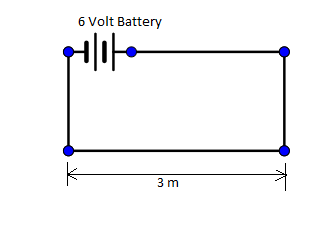Question
Question: A \(6\,V\) battery is connected to the terminals of the three-meter-long wire of uniform thickness a...
A 6V battery is connected to the terminals of the three-meter-long wire of uniform thickness and the resistance of 100Ω. The difference of potential between two points on the wire separated by a distance of 50cm will be.
(A) 1.5V
(B) 3V
(C) 3.5V
(D) 1V
Solution
In this problem, the relation between the voltage, resistance and length is given. The relation between the voltage and resistance and length is given by Ohm’s law. By knowing the relation between these three parameters, the potential difference will be determined.
Formulae Used:
Ohm’s law states that the voltage across any conductor is directly proportional to the resistance.
V∝R and R∝l
Where, V is the voltage, R is the resistance and l is then length of the conductor.

Complete step-by-step solution:
Given that,
The initial voltage, Vi=6V
Resistance, R=100Ω
Length of the wire, l=3m
Potential between two points on the wire separated by a distance, lp=50cm
Assume that, the potential difference between two points as Vf, the length of the wire as li and the difference of potential between two points on the wire separated by a distance as lf.
By Ohm’s law,
V∝R and R∝l
Then,
V∝l
By taking the ratio of initial voltage and initial length to the final voltage and final length, then
VfVi=lfli..............(1)
By substituting the initial voltage, initial and final length in the above equation (1), then
Vf6=50×10−23...................(2)
In the above equation, the final length is substituted in terms of meters.
By taking the Vf in one side and the other terms in other side, then the equation (2) is written as,
Vf=36×50×10−2
On multiplying the numerator in RHS, then
Vf=33
By cancelling the same terms, then the above equation is written as,
Vf=1V
Thus, the above equation shows that the difference of potential between two points on the wire separated by a distance of 50cm is 1V.
Hence, the option (D) is the correct answer.
Note:- For easy calculations some assumptions are made. The difference of potential between two points on the wire separated by a distance of 50cm will be taken as Vf, the length of the wire is taken as li and the difference of potential between two points on the wire separated by a distance is taken as lf.
